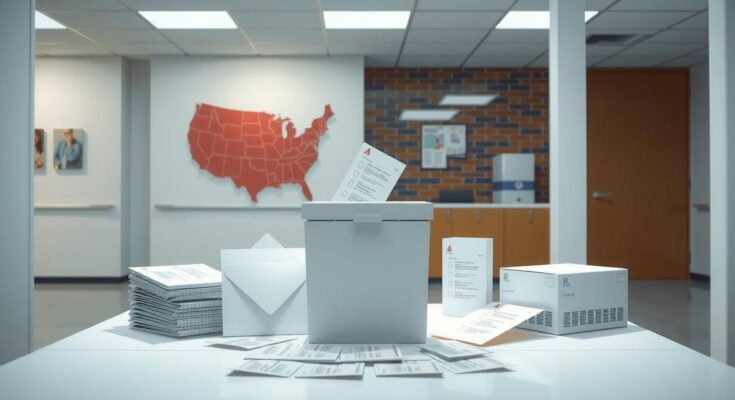Utah Republicans are pushing a bill to overhaul mail-in voting, requiring voters to opt-in for ballots and provide ID details to return them by mail. The proposal aims to enhance election integrity but may confuse voters and lower turnout, particularly affecting marginalized groups. The bill is currently advancing to the Senate, where it will face further discussion and potential revision.
In a significant move, Utah Republicans have initiated a legislative overhaul concerning the state’s election operations, with a particular focus on mail-in voting procedures. On Tuesday, the Republican-controlled House passed a bill by a vote of 57-15 that shifts Utah’s voting system from universal mail-in voting to a model where voters must explicitly request their ballots via mail. Under the new guidelines, starting next year, voters will also need to provide the last four digits of their driver’s license or state ID number to return their ballots by mail or use drop boxes.
This proposed legislation marks a notable shift for Utah, which is one of only eight states, and the only Republican-controlled state, to allow all elections to be conducted via mail without requiring voters to opt-in. House Speaker Mike Schultz expressed concern about being associated with other states known for mail-in voting, indicating, “As a conservative state, that is not a list I am proud to be part of.”
The bill is now set to proceed to the Senate, where Republican leaders contributed to the current version’s formulation. Senate President Stuart Adams expressed satisfaction with the compromise, emphasizing the need to maintain both voter accessibility and election security. An antecedent version of the bill had mandated in-person ID verification for voters wishing to return their ballots by mail, a condition Senate leaders deemed excessive.
Despite ongoing doubts surrounding mail-in voting within Republican circles, legislative auditors concluded last year that there was no widespread evidence of election fraud in Utah. Contrarily, issues concerning delays in purging deceased individuals from voter rolls were identified. Furthermore, House Minority Leader Angela Romero warned that this new bill could confuse voters, potentially disenfranchising vulnerable groups such as the elderly, disabled, and low-income individuals, who may face challenges with the new identification requirements.
Currently, Utah mandates two forms of ID for voter registration but does not require photo identification for casting ballots. The proposal, met with resistance from all House Democrats and some Republicans, aims to amend a system perceived by many as effective, potentially eroding public trust in elections. A majority of Utah’s populace has historically utilized mail-in voting, with election officials matching signatures on submitted envelopes for verification.
While Governor Spencer Cox has expressed confidence in the integrity of Utah’s elections, he has indicated a willingness to reconsider the mail-in voting system for the sake of expedited vote counting. He stated, “We have complete integrity in our elections,” adding concern about the erosion of trust due to delayed decisions on Election Night outcomes.
The proposed legislation stipulates that all ballots must reach county clerks by 8 p.m. on Election Day, a shift from the current allowance for ballots postmarked the day before Election Day to be counted over the subsequent two weeks. Other significant changes to election procedures have been proposed, including reallocating the election oversight responsibilities from the lieutenant governor to an independent elections office managed by a committee of county clerks.
Additionally, proposals have emerged to abolish same-day voter registration, enforce a full month of prior registration requirements, amend signature gathering protocols, elevate the thresholds for citizen ballot initiatives, and withdraw Utah’s participation from the Electronic Registration Information Center. Under President Trump’s influence, a number of Republican-led states have opted out of this collaborative system, aiming to maintain updated and accurate voter registries.
In conclusion, the proposal by Utah Republicans to alter the state’s mail-in voting system could significantly impact voter accessibility and public trust in elections. With new identification requirements and a shift to an opt-in model for mail-in ballots, concerns have been raised regarding potential disenfranchisement of vulnerable voters. As the bill progresses to the Senate, intense scrutiny regarding its implications on electoral integrity and voter turnout is anticipated.
Original Source: apnews.com




